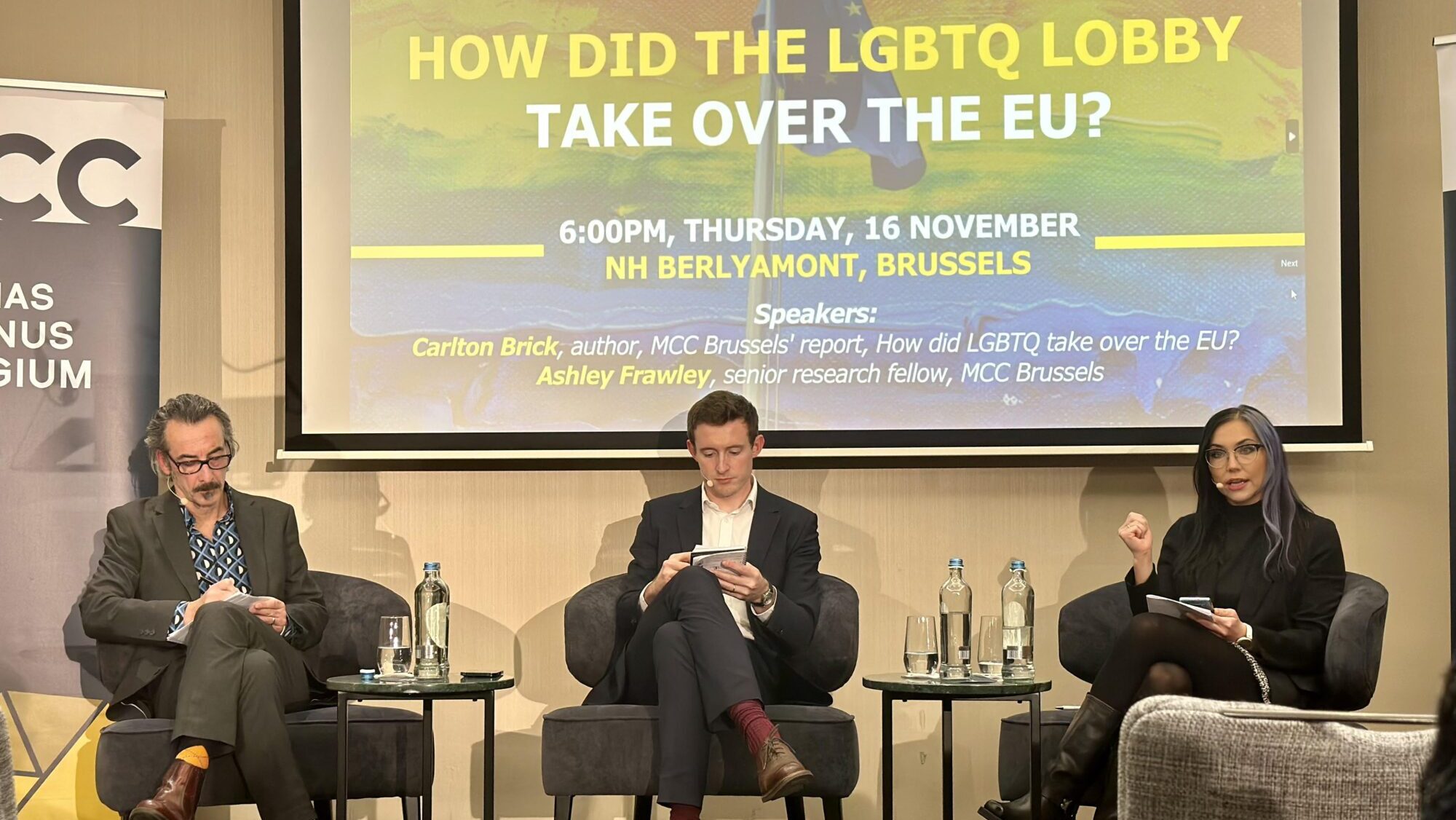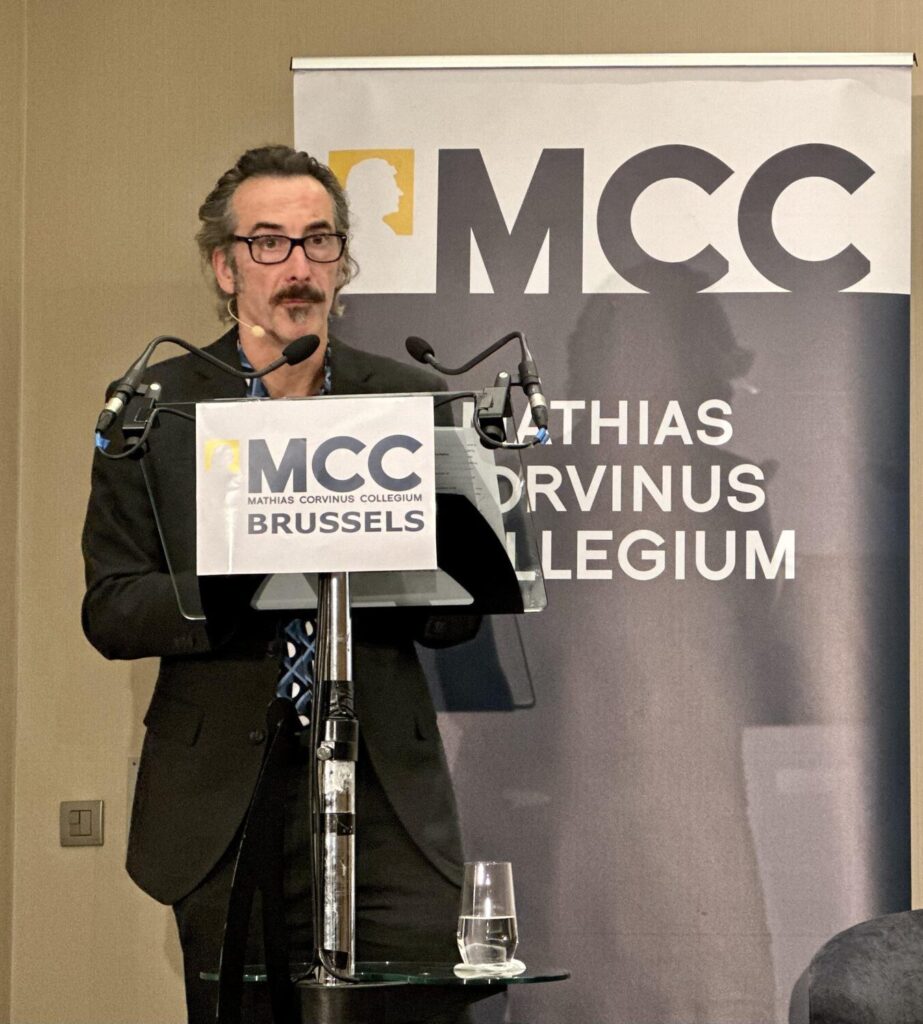
Left to right: Carlton Brick, Jacob Reynolds (moderator), and Ashley Frawley
Photo: The European Conservative
The real reason why LGBT rights have become a driving force in EU policy-making is not a desire to help disadvantaged people, but to assert control over misbehaving member states in an inherently undemocratic way, concludes a new report written by Dr. Carlton Brick of the University of West Scotland and published by MCC Brussels. The author presented his findings during MCC’s panel discussion on Thursday, November 16th, along with comments from sociologist Ashley Frawley, author of two books in the field.
“Sexual identity has become core to how the European Union understands itself, and now frames both its internal and external relations,” Brick observes as the premise of his report, describing how LGBT rights—as the new epitome of social equality—have become an essential part of the post-Cold War identity of the EU in the past twenty years.
By now, LGBT advocacy groups have been deeply incorporated into the EU institutions and Brussels’ decision-making process, giving way to a bizarre symbiotic relationship that permeates even completely unrelated policies. The NGOs found a powerful ally to spread their ideology while giving the European elites the knightly quest they so desperately needed.
With the collapse of the Soviet Union—and the subsequent EU accession of post-communist countries, Western Europe lost both the “other” against which it could define itself and also its mission as a civilizing force that would equip it with moral superiority.

The Cold War categorization of the Soviet ‘other’ “ensured the West’s ideological coherence and institutional unity,” Brick explained on the panel. Singling out Central and Eastern European countries based on the alleged violation of constantly evolving standards now serves the same purpose, a “new East-West divide, driven by prejudice.”
And since the EU needs Central Europe to legitimize its mission, Brussels would not stop even if every member state fell in line, Frawley added. “They’d just push the envelope further and invent new narratives that reinforce the West’s progressiveness against the East’s backwardness again,” she said.
The biggest problem with this top-down, divisive attitude of the European elites is that it undermines the decision-making capacity of member states and therefore disenfranchises their electorates, Brick lamented. The process of mandating legislation through the deliberately vague and constantly evolving principles of the “rule of law” has created a policy template through which the EU disciplines member states, regardless of how undemocratic it is.
When the EU is talking about ‘rule of law,’ they actually mean ‘rule by law,’ as in imposing rules and forcing you to abide by them. When you impose something from above, it disables, [or] deactivates society’s ability to create properly democratic and properly free institutions.
This is not because Eurocrats are evil, Frawley inserted. They genuinely believe they are a force for benevolent progress, she said, and are convinced “that parents will ruin their kids if left to their own device,” that the problem is the people who need to be reformed from above. The European demos is no longer the subject, but the object of the EU’s technocratic policies.
“The narrative is that Central European countries are incapable of democratizing, and progress can only come from outside,” Frawley said. “This is spitting in the face of real progress, which happens through social debate.”
The sociologist then explained that in the 1990s and early 2000s, Western societies had already reached a consensus on LGBT issues, agreeing that everyone was free to pursue their sexuality and live as they see best. But after the fight was picked up by NGOs and the elites—suppressing open debates to legitimize their mission—they broke down the consensus and generated a pushback in society that, ironically, harms gay people the most.
If you forcefully impose your value system on a group, it will do the same with you once it gets into power, Frawley warned, arguing that progress can only happen from within, and trying to achieve it through outside influence is always counterproductive. “Allow democratic pushback, have open and free debates, and stop calling people bigots, please.”
According to Brick, there will be no logical limit to this process because revolutionary identities are constantly reinvented as the norm to uphold the progressive mission. The EU will not stop with these harmful, divisive tactics unless Europeans stand up to it.
